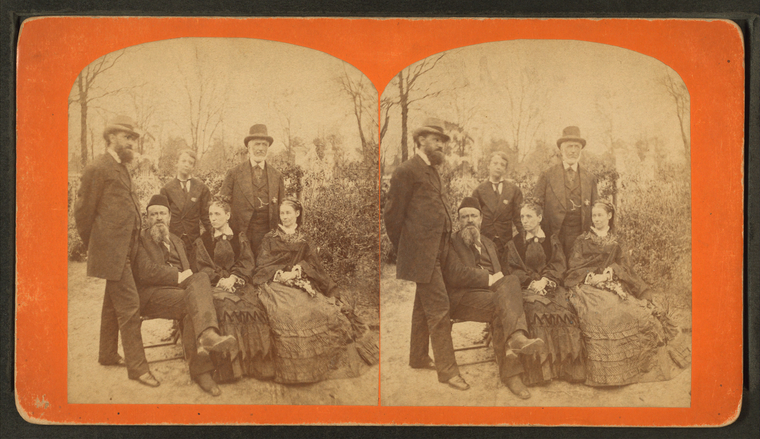 |
| Three men and two women. Who is "outnumbered"? Image Source: NY Public Library |
While I admit that I don't listen to the podcast Stuff You Missed in History Class, I am not surprised to hear that they have received complaints that their show is too focused on women. Why am I not surprised? Because men consistently perceive more gender parity in a group than there actually is. Because despite the stereotype that women talk more than men, men consistently dominate group conversations.
I can't find the link for this stat (because it's been cited so often without crediting), but a recent study showed that men think a group it 50-50 when it is 17% women, and they feel outnumbered once it reaches 33%.
So it's not very surprising that a history show that tells the stories of both men and women is being accused of being "too female-focused", to the point where some listeners are suggesting they put in the title that it is "about women" (I guess we should start putting that shows are about, or for, men in their titles if they have less than 50% female content?)
What the heck is inspiring about this, you may be asking? What is inspiring, is the response of the hosts. They are sick of answering this question, and so they crunched the numbers. Guess what they found?
Unsurprisingly, less than half their shows are specifically about women or female-focused events. Since 2013, women have occupied about 21% of the content of the show, with about 45% for men and the remaining taken up with "ungendered" events.
They close off their post discussing the issue with this:
Allow me to suggest that if you think these charts represent a show that is “mostly about women” or talks about women “too much,” that the problem is not us, our work, or our subject matter.
Can I get an AMEN???
Here's what I want to take away from them on this: we all get criticism from time to time, and sometimes it's for something we think is stupid. We think "even if I am doing that (which I'm not), why would it be a problem???"
Sure, you can just say "eff all y'all" to the critics and move on, but I am one who prefers to engage and respond. At best, you can have a dialogue and both better understand the world. Sure, there's a worst case scenario here where you get completely ignored and/or called horrible names, but I'm an optimist.
From now on I'm going to follow the example of these smart ladies. Instead of allowing someones impression of reality or anecdotal evidence run the conversation, I'll look at the facts and find out what's actually happening. Then you have a choice: shut down the haters with facts or have a conversation with them about it that is informed by facts. Either way, facts are good.

No comments:
Post a Comment